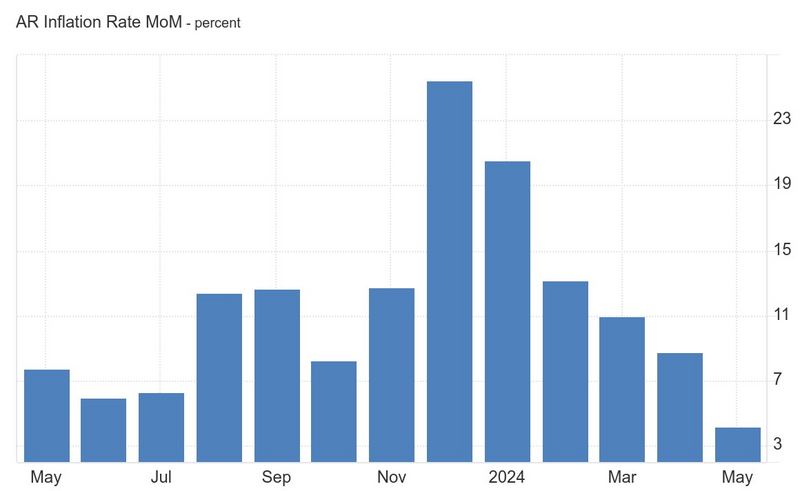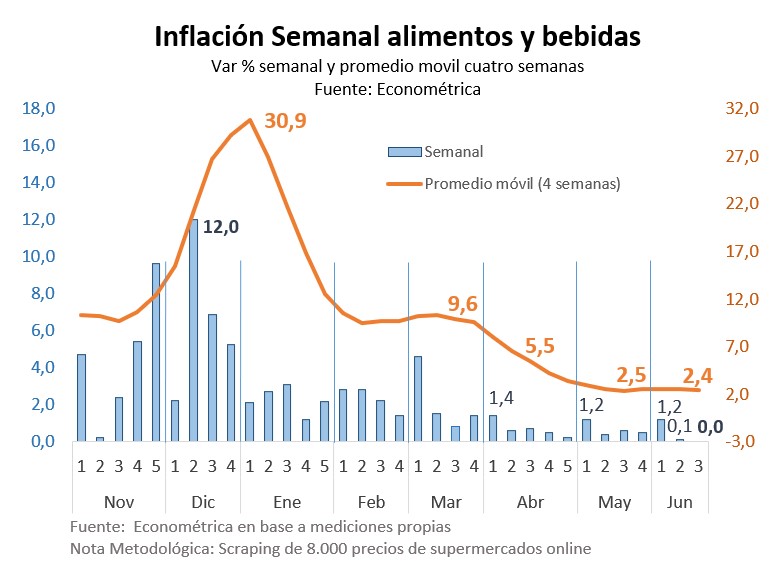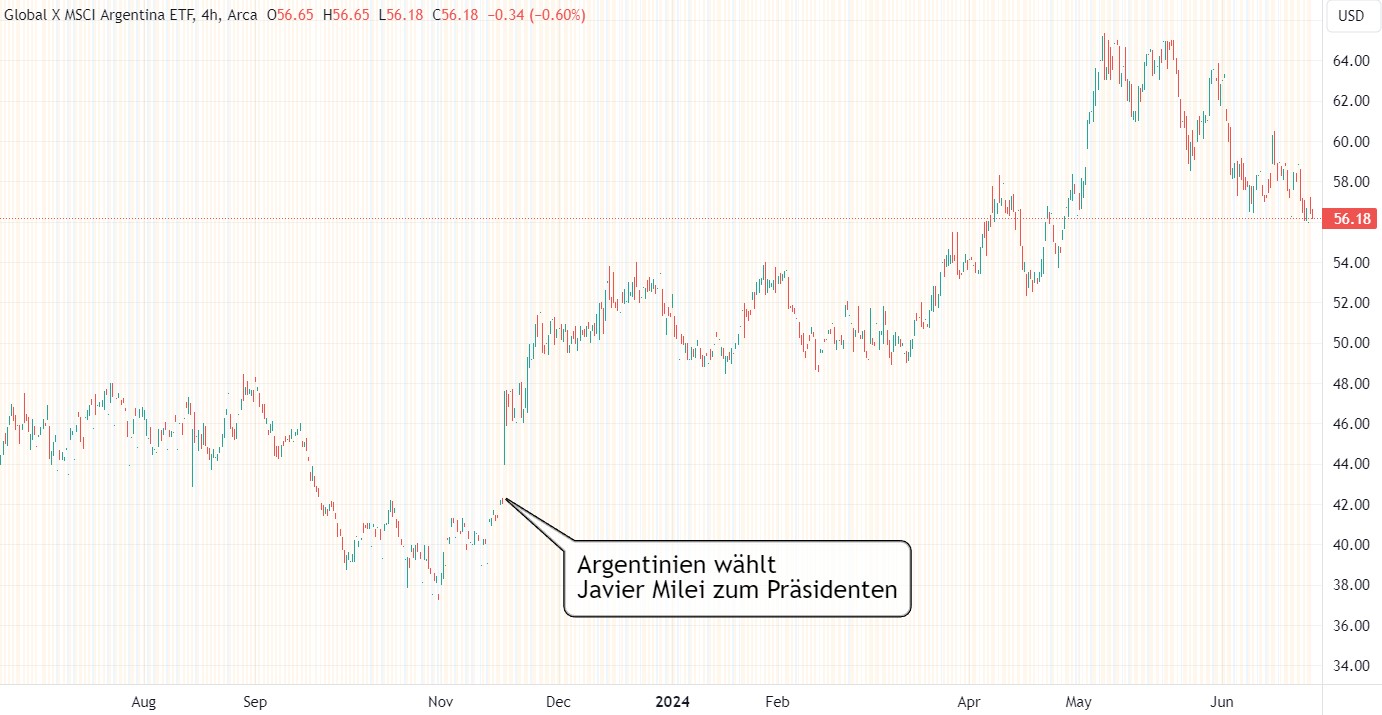Argentina: Javier Milei curbs inflation and is open to Bitcoin
Few people polarize as much as Argentina's President Javier Milei. As part of his visit to Germany, which included a meeting with German Chancellor Olaf Scholz, the leading media once again increasingly reported on his controversial policies. The Tagesschau and co. like to use the term "right-wing populist" for the libertarian leader, who speaks out in favor of free markets and against a bloated state apparatus.
While Milei's radical austerity measures appear to have brought the inflation that has chronically plagued Argentina for decades under control, the 53-year-old reiterated that citizens should also be able to use Bitcoin as money in a free money market.
Inflation is trending downwards
Argentina has been suffering from sharp price increases and a sharp fall in the value of its own currency, the Argentine peso, for decades. The inflation rate for May was 276.4 percent, slightly below the figure of 292.2 percent for April.
However, the still astronomically high inflation figures, which express the change compared to the same month last year, conceal a positive trend that has been observable for several weeks. Since Milei's inauguration on December 10, 2023, inflation rates, which seemed to spiral into the election, have been falling significantly month on month.
This means that prices are still rising compared to the previous month, but at a much slower rate than before. The libertarian president's free-market policies appear to have broken the trend of ever-increasing inflation rates.
Last week was also the first time in a long time that food and beverage prices did not continue to rise compared to the previous week - a major success for the high-inflation country of Argentina.
The government achieved this primarily through radical austerity measures. Milei cut tens of thousands of jobs in the public sector, closed 13 ministries, scrapped infrastructure projects and cut subsidies and social programs. In the first quarter of this year, Argentina posted a budget surplus for the first time since 2008 as a result.
Even though this policy is curbing inflation, it has met with great criticism from parts of the Argentinian population. As a result of the austerity measures, countless civil servants have become unemployed and thus slipped from the middle class into poverty, which is already widespread in the country. Around one in two Argentinians lives below the poverty line. However, this does not prevent more than half of the population from backing the self-proclaimed "anarcho-capitalist" according to recent surveys - albeit with a slight downward trend in approval ratings.
Even if this major change of course in economic policy logically does not satisfy all citizens straight away - especially if they have lost their civil servant job as a result - the majority of citizens seem to have the necessary foresight. After all, if this course proves to be beneficial for the economy in the long term and leads to a stable price level, then the population as a whole should benefit significantly. The devaluation of the local currency is generally regarded as one of the main reasons for the high poverty rate in Argentina.
It will be interesting to see how Argentina's economic situation continues to develop and whether the gross domestic product of Latin America's third-largest economy can also benefit greatly from the change of course in future. One positive aspect in any case is the increased solvency of the South American country, which has gone bankrupt three times since 2001. The Argentinian stock market has also risen considerably since Milei's election - by around a third, measured in US dollars.
The comparison with Mexico in particular is likely to be interesting in the coming months. At the beginning of June, citizens there elected a president with a strong socialist orientation to office. Claudia Sheinbaum places greater emphasis on "social justice", is in favor of significantly higher minimum wages, strengthening state-owned companies and, as an environmental engineer, she wants to place a greater focus on combating climate change.
The stock market of Latin America's second-largest economy after Brazil immediately plummeted by 6 percent in reaction to the news that Sheinbaun would be the new president. Whether Mexico or Argentina performs better in the coming months is likely to have a major impact on the political trend in Central and South America.
Bitcoin in Argentina
In the longer term, Javier Milei plans to abolish the Argentinian central bank. Accordingly, some Bitcoin advocates had high hopes that the South American country would soon adopt Bitcoin, as El Salvador has already done. For the time being, however, the plan is to dollarize the Argentinian economy, which already circulates to a large extent in the global currency.
Nevertheless, the libertarian president has repeatedly spoken out in favor of free monetary competition, in which people can voluntarily decide which money they use. Just a few days after Milei took office, the government introduced a regulation that allows contracts to be agreed in different means of payment. "We ratify and confirm that Argentine contracts can be concluded in Bitcoin," explained Argentine Foreign Minister Diana Mondino on the platform 𝕏 - Blocktrainer.de reported.
Capital controls are currently still in place in Argentina, which the government wants to lift step by step. Banks and payment service providers are still prohibited from offering any kind of crypto and Bitcoin services. Nevertheless, Milei's long-term goal seems to be to establish a free money market in which everyone can pay with the money that suits them best - provided the seller accepts it voluntarily. The president emphasized this just a few days ago on the 𝕏 platform.
Bitcoin for everyone. :)
GaborGurbacs, VanEck
There will be a free competition of currencies, so if you want to use Bitcoin, there will be no problems ... and you can also use other units like WTI, BTU and the most suitable for your business ... In accounting, the problem is solved by the functional currency method ...
JavierMilei
Habrá libre competencia de monedas así es que si querés usar el Bitcoin no habrá problemas... y también podrás usar otras unidades como el WTI, BTU y la que te resulte más acorde en tu negocio...
- Javier Milei (@JMilei) June 19, 2024
Es más contablemente se resuelve por el método de moneda funcional...
A bold experiment
As Bitcoin enthusiasts are usually also supporters of free markets, Argentina's development under the anarcho-capitalist president should also be exciting for them to observe. If the South American country succeeds in generating sustainable prosperity effects by taking the step towards a minimal state, this would be the perfect example to show the advantages of a free market economy and a state that withdraws from the economy.
Whether and to what extent Bitcoin will play a role in Javier Milei's Argentina in the future remains to be seen. As Argentina is at the forefront of the adoption of Bitcoin and the like, it is quite possible that many citizens will opt for the asset as money in a free money market. Bitcoin is limited to just under 21 million units, which means that it can provide protection against the loss of value of state currencies. Due to the high inflation of recent decades, citizens are likely to be sensitized to this issue.










